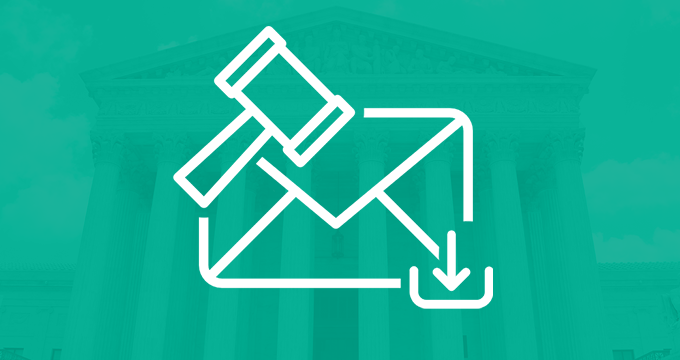With most of our daily business communication happening over email, business owners are aware of their responsibilities toward email archiving under regulatory compliance.
But do you know what email compliance actually is, why it’s important, and how to ensure it for your business?
This article will help you understand everything you need to know about email compliance and secure your business from unwanted lawsuits and fines.
What you’ll learn:
- What email compliance is and why it matters.
- Who is responsible for email compliance?
- Laws and bodies governing email compliance.
- How your email management policy should look like.
- Email compliance challenges you can solve with technology.
- Email compliance checklist.
Let’s get started.
What Is Compliance Legislation?
Email compliance refers to a business’s ability to conform to rules and regulations mandated by the government, state, or industry.
These rules and regulations specify how a business must handle the retention of its electronic records, email privacy and security, and anti-spam standards.
Some of these laws include:
- Workplace fairness
- IRS regulations
- Freedom of Information Act (FOIA)
- Gramm-Leach-Bliley Act
- The Sarbanes-Oxley Act
- The Federal Rules of Civil Procedure (FRCP)
All these compliance laws mandate the retention of electronically stored information and communications data for a certain period of time (typically 7 years) while sticking to certain levels of data security.
This means that such email data should be protected from unauthorized access and stored for a certain amount of time before it can be disposed of, in case it is required for any kind of legal purpose.
Email Archiving for Compliance: Why It Matters
Every day, important business decisions and commitments are communicated via email, from confidential business documents to financial records.
All of these emails contain important data in the form of text and attachments. This is why email constitutes a valid business record.
Companies must legally preserve email correspondence. Failing to capture, store, and archive all business emails means non-compliance with strict email compliance laws and regulations.
Not complying entails hits to your reputation, lawsuits, and hefty fines which can be severe depending on how you handle email compliance.
Here are a few best-known examples of email non-compliance fines:
- In 2006 Morgan Stanley was fined $15 Million by the SEC for delayed handling of emails, destroying emails, and wasn’t forthcoming about their communications.
- A total of five Wall Street brokerages had to pay $8.25 million because they had discarded emails related to customer transactions.
- Inappropriate emails sent by employees caused embarrassment for a top UK law firm. After the scandal, the media bombarded their head office for weeks.
- In the UK, the Inland Revenue Office took action against around 200 employees in relation to the misuse of email.
- In the UK, a bank was fined £2.3 million for failing to adhere to email compliance regulations.
As you can see, the consequences and fines can be huge, and that’s why many companies are implementing email archiving compliance in their communication systems.
And this brings us to the next question.
Who Is Responsible for Email Compliance?
Keeping your business compliant takes a lot of effort and attention from a wide group of employees, supervisors, and executives.
In fact, everyone is responsible for email compliance:
- IT managers need to ensure there are email retention policies and strategies in place that set specific procedures about how email should be handled.
- Sysadmins need to ensure the proper archiving tools are implemented.
- Compliance officers need to ensure all information is preserved for as long as possible in a prescribed manner;
- Employees need to follow company procedures and only use the official enterprise communication channels.
There are numerous different rules that need addressing and a wide potential for variation from industry to industry, which makes it difficult to keep track of all obligations.
At times, archiving email communications may be overlooked in favor of more pressing or extensive concerns, despite the daily influx of numerous messages and conversations.
However, today, you can’t really afford to not have a good records retention policy. Simply put, the aftermath can be grueling and can be a huge blow to your business standing.
Email Regulatory Compliance Laws and Bodies
While there are many email compliance regulations, here’s a rundown of essential rules that govern corporate email regulatory compliance across industries.
| Industry | Regulation/Regulatory Body | Retention Period |
| All | Internal Revenue Service (IRS) | 7 years |
| All (Government + Education) | Freedom of Information Act (FOIA) | 3 years |
| All public companies | Sarbanes-Oxley (SOX) | 7 years |
| Education | FERPA | 5 years |
| Financial | Gramm-Leach-Bliley Act (GLBA) | 7 years |
| Financial (Banking) | FDIC | 5 years |
| Financial (Brokers, dealers, investment bankers, securities firms) |
FINRA, SEC 17a-4, SEC 17a-3 | 7 years |
| DOD contractors | DOD 5015.2 | 3 years |
| Credit card companies | PCI DSS | 1 year |
| Healthcare | HIPAA | 7 years |
| Pharmaceutical | FDA | 2 years |
| Telecommunications | FCC | 2 years |
| Related: Ultimate Compliance Checklists for Education and Government |
Why Email Is the Main Cause of Compliance Issues
As previously mentioned, there are more than a dozen laws and regulations governing email communication and retention.
With so much email communication, it’s very easy for a business to slip up and break one of these regulations which leads to fines and legal action.
For instance, under the Sarbanes-Oxley Act (SOX), you must keep all of your business emails for 5 years and they can’t be altered in any way. But what if one of your employees alters or deletes it?
It’s on you to cover the damages.
This is only one example that says, you need to archive and secure your email, build email management policies, and adhere to all email retention regulations.
But how can you comply with every law there is and secure email regulatory compliance for your business?
Start off with your email management policy.
What Your Email Management Policy Should Look Like
While the drive towards email archiving compliance is on the increase, a large number of companies still don’t have a functional and clearly defined email management/retention policy.
In short, a good email policy should specify the following:
- During retention periods, organizations have to ensure that their data is available, searchable, secure, and quickly recoverable.
- During legal proceedings, harassment cases, and ediscovery requests, access to email archives is often required for evidence.
- The integrity of email is vital so that it can be used as evidence in court cases. Archived data must be stored in its initial state without any edits.
Organizations need to retain this information, and do so in a way that meets specific requirements about formatting, time spent in storage, and other concerns.
Businesses must make sure all of these small details are addressed appropriately, or else a well-intentioned compliance effort can fail and lead to issues with regulators.
To ensure you manage your email well you will need two things:
- A well-developed email retention policy specifically designed for your industry and business processes.
- The right email archiving system that supports your policy and business activities.
But it’s not just about picking the right email compliance software and creating a retention policy, there are a few challenges you will need to overcome.
Email Compliance Challenges and Technology Solutions
While email compliance regulations must be met for your organization to stay in business, there are many challenges that you need to address:
- Ensure your staff understands and adheres to email compliance requirements.
- Minimize costs associated with email compliance.
- Regulate the continuous source of new email communications.
- Balance email compliance regulations with data privacy laws.
- Identify and manage the specific retention periods required by different regulations.
- Handle the secure storage of electronic data, such as emails and social media content.
- Navigate complex legal and regulatory landscapes.
- Ensure that archived data remains tamper-proof and accessible.
- Demonstrate the ability to discover stored information quickly.
With so many complex challenges, there’s no compliance officer team in the world that can handle them manually, but there are specialized solutions designed to make the job easy.
Email compliance archiving solutions are specialized software that automates your email compliance work, reducing your margin of error to 0% and keeping you compliant with federal and state laws.
These software come with a suite of features like:
- Automated email capture — Instantly capturing all email communication including their attachments in the exact state they were sent in even if they were deleted by the sender.
- Secure storage — All the data being archived is encrypted by the latest technologies and backed up on a cloud storage device.
- Email advanced searching — Utilizing advanced filters to find specific emails by their keyword or multiple other operators.
- Exporting — Ability to export select messages and chats in different formats like PDF.
- Custom retention policies — Ability to create automated retention policies that retain and delete archived messages based on their age or other parameters.
- Centralized storage — One place for all business data archiving including email, social media, and WhatsApp.
Advanced solutions that automate much of the process reduce the obligation for employees and ensure a high level of compliance.
When there’s no room for human error in email compliance efforts, they’re more likely to be successful.
Archiving Email Protects Customers and Companies
Most businesses manage and keep not only sensitive information about the business itself but also about their clients, partners, and customers.
The key thing here is for customer data to remain private, which is one of the reasons email compliance legislation exists.
Also, if an organization decides to take legal action against your business or vice versa, all records must be kept intact and unmodified in case they are required as evidence.
Even if you’re running a small business, it is vital that all data relating to accounts, transactions, and customers is securely archived for later auditing if it is required.
Failing to correctly archive sensitive data opens up businesses to legal scrutiny, reputational damage, and fines. Compliance really affects the core of IT departments and IT infrastructure within an organization.
Email Compliance Checklist
An email compliance checklist is a great way to ensure that business owners have everything in order so that they can avoid legal issues down the line. While compliance laws vary from country to country, the idea of data protection boils down to some general points.
The following list is a starting point for any business owner wishing to get their data privacy compliance in order. Remember that these points do not in any way constitute a complete data protection policy — they are guidelines that require significant follow-up work.
- Assess your requirements — Consult with your legal team to determine which compliance laws affect your organization and how long your retention periods need to be.
- Designate a compliance officer — Appoint an individual within the organization to oversee email compliance and data protection. This person can serve as the Data Protection Officer (DPO) or Compliance Officer and should ensure comprehensive compliance across all business areas.
- Register with regulatory bodies — If your business operates in a country with an Information Commissioner or Data Compliance Regulator, ensure the organization is registered with these authorities.
- Identify data sources — Assess how various types of data enter and move through the organization. Compliance teams should pinpoint data collection points, such as website portals, email systems, social media, phone systems, or CCTV.
- Distinguish between data types — Differentiate between first-party and third-party data. Evaluate which data needs archiving, the duration of retention, and data that can be safely deleted. In the context of email data, complete archiving is usually the standard practice.
- Secure marketing data — If your organization has a marketing department, it’s crucial to secure email lists and data in compliance with privacy and communications laws.
- Train employees — Ensure that all staff are trained in proper procedures for handling personal data, especially sensitive email communications. Employees should be aware of the legal implications of unauthorized data disclosure. Every member of staff from the top down should be aware of their individual responsibilities. Remember that the most common compliance problem isn’t the lack of procedure, but individual errors and confusion over requirements and responsibilities.
- Have a data backup strategy — Identify methods for securely backing up sensitive data to maintain compliance. For email data, consider using compliant email archiving compliance solutions as the most effective approach to meet legal requirements.
- Get an archiving solution — Archive all data types in a manner that supports ediscovery during legal proceedings.
Conclusion
Navigating the business world is hard and only made harder by the abundance of email compliance regulations you need to adhere to.
Luckily, you just learned everything you need to know about:
- What email compliance is why it matters for your organization.
- The different responsibilities you have towards each regulation.
- How you should manage your organization’s email communication.
- How email archiving solves all of your compliance challenges.
Now all you need to secure your organization from unwanted legal penalties is an adequate email archiving solution that suits your specific needs and requirements, so you can focus on what matters most – growing your business and achieving your goals.
Solve all of your email archiving needs with Jatheon’s cloud email archiving solution built for businesses of all sizes. Stay compliant, speed up your ediscovery, and retain all of your business data in one easy-to-use solution.
FAQ
What is compliance archiving?
Compliance archiving is the process of storing electronic records to ensure an organization adheres to legal and regulatory requirements. It is crucial for organizations in highly regulated industries to avoid legal penalties and maintain data integrity.
What is the email archive policy?
An email archive policy is a set of guidelines defined by an organization as to which email data and for how long it needs to be archived in order for the organization to stay compliant. Email archive policies are based on a set of specific government regulations that differ across different industries.
Is email archiving required for email compliance?
Email archiving is necessary for an organization to stay compliant with email retention laws and regulations, especially in highly regulated industries. While there are ways of complying without having an email archiving system, all of them take considerably more time and resources to accomplish. This is why it’s the best practice to have an email archiving system in place.
What is email compliance?
Email compliance refers to an organization’s ability to adhere to laws and regulations governing the use and management of email communications. It aims to protect an organization’s sensitive information, preserve data integrity, and avoid legal and regulatory penalties associated with email misconduct.
What emails should be archived for compliance?
It depends on the industry in question, but in most cases, email compliance regulations require the archiving of business records, regulatory data, and business and customer communications.








